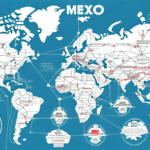International Shipping: Choosing Between DHL and UPS
International shipping is a cornerstone of today’s global economy, enabling businesses and individuals to transport goods and parcels across borders efficiently. Among the most reputable carriers for international shipping are DHL and UPS. This article provides a comprehensive comparison of DHL and UPS, analyzing their strengths and weaknesses, evaluating their key features and services, and offering insights to help you make informed decisions for your shipping needs.
Understanding the Importance of International Shipping
International shipping is essential for businesses aiming to expand their reach and access new markets. It allows companies to transport goods, products, and supplies across borders, facilitating access to diverse customer bases and fostering economic growth through international trade. According to the United Nations Conference on Trade and Development (UNCTAD), global trade volumes have consistently increased, highlighting the critical role of efficient shipping solutions.
One significant advantage of international shipping is the ability to leverage lower production costs in different countries. For instance, a company based in the United States may find it more cost-effective to manufacture products in China and then ship them back for distribution, thereby enhancing profit margins.
However, international shipping presents challenges such as navigating complex customs regulations, overcoming language barriers, and ensuring safe packaging and transportation of goods. Partnering with experienced shipping carriers like DHL and UPS can help businesses mitigate these challenges and ensure timely, secure deliveries.
Key Factors to Consider When Choosing a Shipping Carrier
Shipping Rates
Shipping rates are a primary consideration, varying based on destination, shipment weight and size, and selected service type. Both DHL and UPS offer competitive rates, but it's essential to compare specific quotes based on your shipping needs.
Delivery Speed and Transit Time
Different carriers offer various delivery speeds, from express to standard shipping. Evaluate the transit times provided by DHL and UPS to ensure they meet your business requirements and customer expectations.
Reliability and Reputation
A carrier’s reputation for reliability is crucial. Look for carriers with a strong track record of on-time deliveries and minimal damages. Customer reviews and industry ratings can provide insights into each carrier's reliability.
Tracking and Visibility
Advanced tracking capabilities allow you to monitor shipments in real-time. Both DHL and UPS offer robust tracking systems, but assess which one provides the most detailed and user-friendly tracking features for your operations.
Customer Service and Support
Effective customer service is vital for resolving issues and ensuring smooth shipping processes. Compare the customer support services offered by DHL and UPS, including availability, responsiveness, and the range of support channels.
Packaging Requirements
Proper packaging is essential for international shipments. Each carrier has specific packaging guidelines that must be followed to ensure that goods are protected during transit and comply with international shipping standards.
Customs Clearance
Efficient customs clearance processes are critical for avoiding delays. Evaluate how DHL and UPS handle customs documentation, compliance, and brokerage services to streamline the clearance process.
Insurance Coverage
Protecting your shipments with appropriate insurance is important, especially for valuable or fragile items. Compare the insurance options and coverage limits provided by DHL and UPS to safeguard your goods.
Additional Services
Both DHL and UPS offer a range of additional services such as warehousing, fulfillment, trade management, and supply chain optimization. Identify which additional services align with your business needs.
Comparing DHL and UPS for International Shipping
Strengths and Weaknesses
DHL is renowned for its exceptional customer service and advanced tracking capabilities. It excels in providing detailed shipment visibility and support for specialized shipping needs. However, DHL may have limited coverage in certain remote or rural areas, potentially leading to longer delivery times and higher costs in these regions.
UPS, on the other hand, is recognized for its reliability and speedy deliveries, supported by an extensive global network that reaches more destinations, including remote areas. UPS also places a strong emphasis on sustainability, implementing initiatives to reduce its carbon footprint, which can be a deciding factor for environmentally-conscious businesses.
Shipping Rates Comparison
Both DHL and UPS offer competitive international shipping rates, but the actual costs depend on various factors such as destination, shipment dimensions, weight, and selected service. It's advisable to obtain quotes from both carriers to determine which offers better rates for your specific shipping needs.
Delivery Speed and Transit Time
DHL is known for its fast transit times and a wide array of express shipping options, making it ideal for time-sensitive shipments. UPS provides a variety of delivery services, including ground, air, and ocean freight, catering to diverse shipping timelines and requirements.
Customer Service and Support
DHL has a reputation for responsive and efficient customer service, with dedicated teams handling inquiries and issues. UPS boasts a larger customer service team, resulting in shorter wait times and readily available support.
Tracking and Visibility Features
Both carriers offer advanced tracking systems. DHL’s technology provides real-time updates on shipment status and location, while UPS offers comprehensive tracking features through its online platform and mobile app, ensuring that businesses can monitor their shipments effectively.
Packaging Requirements
Adhering to packaging requirements is crucial for international shipments. DHL and UPS provide detailed packaging guidelines to ensure shipments are adequately protected during transit. Businesses should familiarize themselves with each carrier’s packaging standards to prevent delays or damages.
Customs Clearance Processes
DHL and UPS both assist with customs clearance, offering services that help navigate the complexities of international regulations. They provide necessary documentation support and brokerage services to facilitate smooth customs processing.
Insurance Coverage
Insurance options vary between carriers. DHL and UPS offer different levels of coverage based on shipment value and type. It's important to evaluate the insurance policies of each carrier to ensure adequate protection for your goods.
Additional Services
Both DHL and UPS offer additional services such as warehousing, fulfillment, and supply chain solutions. These services can enhance your shipping operations by providing comprehensive logistical support and optimizing your supply chain efficiency.
Case Studies: Successful International Shipping with DHL and UPS
Numerous businesses have successfully utilized DHL and UPS for their international shipping needs. For example, Forbes highlights how companies leverage UPS’s extensive network to streamline global distribution, while Logistics Management discusses DHL's effectiveness in emerging markets through its specialized services.
Tips for Choosing Between DHL and UPS for International Shipping
- Assess Your Shipping Volume and Frequency: Consider which carrier can better accommodate your shipping volume and provide scalable services as your business grows.
- Evaluate Service Options: Determine which carrier offers the specific shipping services you require, such as express delivery or specialized handling.
- Consider Cost vs. Value: Balance the cost of shipping rates with the value provided by each carrier’s services and reliability.
- Check Global Reach: Ensure the carrier has a strong presence in the regions you are targeting to avoid potential delivery issues.
- Review Technology Integration: Look for carriers that offer seamless integration with your existing shipping software and provide robust tracking capabilities.
- Assess Customer Support: Choose a carrier that offers reliable and accessible customer support to address any shipping concerns promptly.
Conclusion: Making the Right Choice for Your Business Needs
Both DHL and UPS are reliable and trusted carriers for international shipping, each offering a range of services tailored to different business needs. DHL stands out for its exceptional customer service and advanced tracking, while UPS excels in reliability, delivery speed, and sustainability initiatives. By carefully evaluating your specific shipping requirements, considering key factors such as rates, delivery speed, and customer support, and leveraging the strengths of each carrier, you can make an informed decision that aligns with your business goals and ensures successful international shipping.
For more information on optimizing your international shipping strategy, visit ShipScience.






















